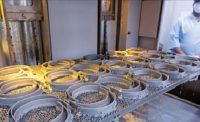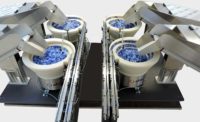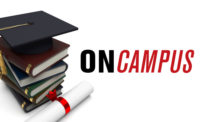As of April 19, more than 2.4 million cases of COVID-19 have been reported in 235 countries. Worldwide, more than 165,000 people have died from the disease, but more than 612,000 have recovered. The United States is now the epicenter of the pandemic, with 763,597 cases and 40,560 deaths. Both figures far exceed the totals of any other country.
Rather than grouse about government-imposed lockdowns to prevent the spread of coronavirus, manufacturers have stepped up to fight the disease and help healthcare workers and first responders.
Ford Motor Co. has joined forces with 3M and GE Healthcare to expand production of urgently needed medical equipment and supplies. For example, the automaker developed a plan to assemble more than 100,000 face shields per week and harness its additive manufacturing expertise to produce components. A Ford assembly plant in Ypsilanti, MI, was quickly converted to produce ventilators with 500 paid volunteer employees working in three shifts. The goal is to produce more than 7,000 devices per week.
General Motors converted factories in Kokomo, IN, and Warren, MI, to medical device production. The automaker is mass-producing face masks at the former facility and ventilators at the latter. It is collaborating with Ventec Life Systems on the ventilators. GM also partnered with some of its suppliers to provide the materials and equipment necessary for production. For instance, JR Automation and sister company Esys Automation built an assembly line in one week that automatically folds, welds and cuts face masks.
Automotive suppliers are helping, too. For example, Lear Corp. has added capacity at its AccuMED assembly plant in the Dominican Republic to produce protective masks. In less than 72 hours, the operation was expanded from three production lines to seven, and now employs 200 people. Lear recently donated masks to the Detroit Medical Center, the largest healthcare provider in southeast Michigan, and the city of Detroit for use by the police and fire departments.
Manufacturers in other industries are also helping. For example, after the South Carolina Hospital Association found 190,000 new N95 surgical masks that needed new elastic bands in order to be used, Sleep Number Corp. volunteered to help. At its assembly plant in Irmo, SC, the bed maker dedicated sewing machines and a group of sewing team members to attach new elastic bands to the masks. Furniture maker Steelcase is producing masks, face shields, and plexiglass barriers that can be mounted to a desktop or the floor for screening and communicating with visitors at safe social distances.
The list goes on and on.
No one wants to be in this situation. We could complain. We could sit on our hands. But that’s not us. When faced with a crisis, we band together and put our ingenuity and manufacturing muscle to work to solve the problem. To every manufacturer that’s lending a hand: Thank you.




